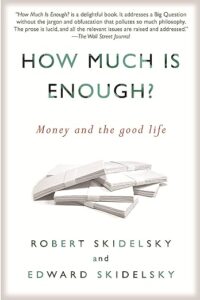In this episode of EconTalk, Russ Roberts hosts Robert Skidelsky for a conversation about his book, co-written with his son Edward: How Much is Enough? Money and the Good Life. Robert Skidelsky is a Member of the House of Lords of the United Kingdom and an economic historian who wrote a notable biography of British economist John Maynard Keynes.

Skidelsky’s concept of “enough” was inspired by Keynes, as Keynes believed people would be working less by now, because they reached a quantity of enough in terms of goods and held a diminishing marginal utility. Keynes was wrong, but like Keynes, Skidelsky is calling for leisure to be prioritized and working hours to be lowered.
What have Keynes and Skidelsky overlooked in terms of the quality of goods and the nature of the market? Skidelsky says that generally, technological improvements are quite trivial. Is this true?
Another point of convergence for Keynes and Skidelsky is the argument for enjoying the now as opposed to calculating for the future. Skidelsky believes that religion and other planning purposes have decreased the value of current enjoyment. Russ says he is all for stopping to look around and enjoy the moment, but that he also values his faith and caring for the soul as an appeal to living for the future.
Whose view do you think is more popular today- Roberts’ or Skidelsky’s- and why? What are the pitfalls of a life that overemphasizes leisure? That underemphasizes it?
Skidelsky frames his view of the ‘good life’ with seven items he believes are integral to living a good life: health, security, respect, personality, harmony with nature, and friendship. Skidelsky thinks the government should ‘nudge’ people towards this good life.
How might the government go about so nudging? What problems do you see with that? Is the government or the market responsible for producing the goods of the good life?
Skidelsky believes that society overproduces consumption goods and underproduces the goods of the good life. He says that once a ‘plateau of wealth’ has been reached, society should produce the goods of the good life instead of consumption goods.
Is Skidelsky falling into Adam Smith’s man of system trap in trying to move chess pieces on the board?
Skidelsky believes that Americans are too skeptical of government, and that the government and advertising already nudge us. Russ believes that our mistrust of government power comes from the American founding.
How does Skidelsky underestimate the effect on liberty if the government were to have the power to ‘nudge’ people toward the good life? Are people ‘suckers’ for advertising as much as Skidelsky makes them out to be? What makes advertising important for the market, and how does it improve the consumer experience?
Brennan Beausir is a student at Wabash College studying Philosophy, Politics, and Economics and was a 2023 Summer Scholar at Liberty Fund.


READER COMMENTS
David Henderson
Oct 27 2023 at 4:24pm
You write:
Yes.
EW Benson
Oct 28 2023 at 8:53am
Likewise for the theory of steady state or ecological economics
or maybe the Truman show and on to Thanos
the question is why are we entertained by stories where the mastermind trampling others to achieve their vision are the bad guys but in real life they are actually propped up as a visionary, leader, or savior?
Luke J
Dec 27 2023 at 12:50am
Thorstein Veblen is a name I’d forgotten until BBC Radio 4 “The Theory of the Leisure Class” popped-up in my podcast feed. I’ve not read Veblen’s book (nor Skidelsky’s), but most everyone around me consumes excessively and will admit (when pushed) that they’re suckers for advertising.